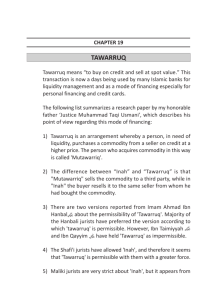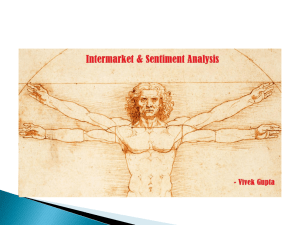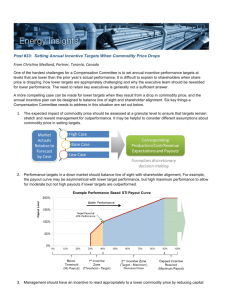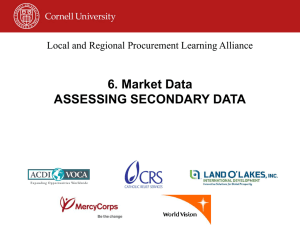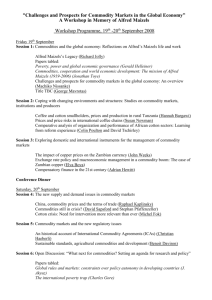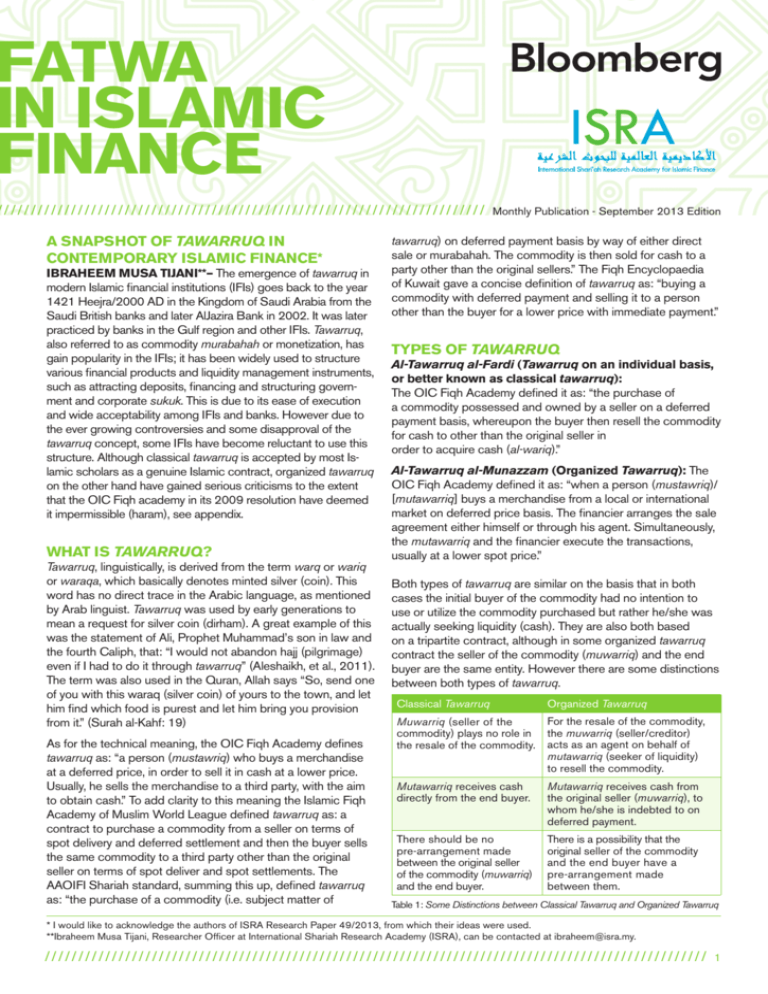
FATWA
IN ISLAMIC
FINANCE
/// // // ////// / / / / / / / / / / / / ////////////////////////// / / / / / / / / / / / / / / / / / / / / / /
A SNAPSHOT OF TAWARRUQ IN
CONTEMPORARY ISLAMIC FINANCE*
IBRAHEEM MUSA TIJANI**– The emergence of tawarruq in
modern Islamic financial institutions (IFIs) goes back to the year
1421 Heejra/2000 AD in the Kingdom of Saudi Arabia from the
Saudi British banks and later AlJazira Bank in 2002. It was later
practiced by banks in the Gulf region and other IFIs. Tawarruq,
also referred to as commodity murabahah or monetization, has
gain popularity in the IFIs; it has been widely used to structure
various financial products and liquidity management instruments,
such as attracting deposits, financing and structuring government and corporate sukuk. This is due to its ease of execution
and wide acceptability among IFIs and banks. However due to
the ever growing controversies and some disapproval of the
tawarruq concept, some IFIs have become reluctant to use this
structure. Although classical tawarruq is accepted by most Islamic scholars as a genuine Islamic contract, organized tawarruq
on the other hand have gained serious criticisms to the extent
that the OIC Fiqh academy in its 2009 resolution have deemed
it impermissible (haram), see appendix.
WHAT IS TAWARRUQ?
Tawarruq, linguistically, is derived from the term warq or wariq
or waraqa, which basically denotes minted silver (coin). This
word has no direct trace in the Arabic language, as mentioned
by Arab linguist. Tawarruq was used by early generations to
mean a request for silver coin (dirham). A great example of this
was the statement of Ali, Prophet Muhammad’s son in law and
the fourth Caliph, that: “I would not abandon hajj (pilgrimage)
even if I had to do it through tawarruq” (Aleshaikh, et al., 2011).
The term was also used in the Quran, Allah says “So, send one
of you with this waraq (silver coin) of yours to the town, and let
him find which food is purest and let him bring you provision
from it.” (Surah al-Kahf: 19)
As for the technical meaning, the OIC Fiqh Academy defines
tawarruq as: “a person (mustawriq) who buys a merchandise
at a deferred price, in order to sell it in cash at a lower price.
Usually, he sells the merchandise to a third party, with the aim
to obtain cash.” To add clarity to this meaning the Islamic Fiqh
Academy of Muslim World League defined tawarruq as: a
contract to purchase a commodity from a seller on terms of
spot delivery and deferred settlement and then the buyer sells
the same commodity to a third party other than the original
seller on terms of spot deliver and spot settlements. The
AAOIFI Shariah standard, summing this up, defined tawarruq
as: “the purchase of a commodity (i.e. subject matter of
Monthly Publication - September 2013 Edition
tawarruq) on deferred payment basis by way of either direct
sale or murabahah. The commodity is then sold for cash to a
party other than the original sellers.” The Fiqh Encyclopaedia
of Kuwait gave a concise definition of tawarruq as: “buying a
commodity with deferred payment and selling it to a person
other than the buyer for a lower price with immediate payment.”
TYPES OF TAWARRUQ
Al-Tawarruq al-Fardi (Tawarruq on an individual basis,
or better known as classical tawarruq):
The OIC Fiqh Academy defined it as: “the purchase of
a commodity possessed and owned by a seller on a deferred
payment basis, whereupon the buyer then resell the commodity
for cash to other than the original seller in
order to acquire cash (al-wariq).”
Al-Tawarruq al-Munazzam (Organized Tawarruq): The
OIC Fiqh Academy defined it as: “when a person (mustawriq)/
[mutawarriq] buys a merchandise from a local or international
market on deferred price basis. The financier arranges the sale
agreement either himself or through his agent. Simultaneously,
the mutawarriq and the financier execute the transactions,
usually at a lower spot price.”
Both types of tawarruq are similar on the basis that in both
cases the initial buyer of the commodity had no intention to
use or utilize the commodity purchased but rather he/she was
actually seeking liquidity (cash). They are also both based
on a tripartite contract, although in some organized tawarruq
contract the seller of the commodity (muwarriq) and the end
buyer are the same entity. However there are some distinctions
between both types of tawarruq.
Classical Tawarruq
Organized Tawarruq
Muwarriq (seller of the
commodity) plays no role in
the resale of the commodity.
For the resale of the commodity,
the muwarriq (seller/creditor)
acts as an agent on behalf of
mutawarriq (seeker of liquidity)
to resell the commodity.
Mutawarriq receives cash
directly from the end buyer.
Mutawarriq receives cash from
the original seller (muwarriq), to
whom he/she is indebted to on
deferred payment.
There should be no
pre-arrangement made
between the original seller
of the commodity (muwarriq)
and the end buyer.
There is a possibility that the
original seller of the commodity
and the end buyer have a
pre-arrangement made
between them.
Table 1: Some Distinctions between Classical Tawarruq and Organized Tawarruq
* I would like to acknowledge the authors of ISRA Research Paper 49/2013, from which their ideas were used.
**Ibraheem Musa Tijani, Researcher Officer at International Shariah Research Academy (ISRA), can be contacted at ibraheem@isra.my.
////// / / / / / / / / / / / / ///////////////////////// / / / / / / / / / / / / / / / / / / / / / / / / / / / / / / / / / / / / / / / / / / / / / / / / / / / / / / / /
1
FATWA IN
ISLAMIC FINANCE
/// / // /////// / / / / / / / / / / / ////////////////////////// / / / / / / / / / / / / / / / / / / / / / / / / / / / / / / / / / / / / / /
Al-Tawarruq Al-Masrafi (Banking Tawarruq):
Banking tawarruq, although consider as a form of organized
tawarruq by Muslim jurist, is a process where the IFIs
formally organize the sale of a commodity (other than gold
or silver) between an international commodity market or
other market and mutawarriq, for a delayed payment on a
binding condition that may be stipulated in the contract or
the custom and norms guiding such a commodity. The IFIs, for
example, will represent the mutawarriq in selling it to another
buyer for cash, where upon the bank will deliver its payment
to the mutawarriq (Bouheraoua, 2009).
Reverse Tawarruq: it is similar to organized tawarruq,
but in this case, the mutawarriq (seeker of liquidity) is the
financial institution, and it acts as a client seeking liquidity.
PARTIES INVOLVE IN A
TAWARRUQ TRANSACTION
In a legitimate and bone fide tawarruq contract, i.e. tawarruq
fardi, there are three parties involve. There is the buyer
(mutawarriq); this is the party that is seeking liquidity, and
therefore advances his/ her request to an individual or a
financial institution, who plays the role of a seller or creditor
(muwarriq). The muwarriq thereby sells the commodity to
the mutawarriq on deferred payment basis. The mutawarriq,
having possession of the commodity, sells the commodity on
spot value to another party, i.e. the third party, other than the
muwarriq to obtain cash; which was the original intention of
the mutawarriq.
Deposit
Commodity murabahah deposit facility
and placement
Financing
Personal financing, asset financing,
cash line facility, contract financing,
commodity murabahah financing,
education financing, revolving credit
facility, working capital financing, home
financing, project financing facilities
Liquidity
Management
and Debt
Restructuring
BNM Islamic accepted bills (IABs),
islamic private debt securities (IPDSs),
interbank commodity murabahah.
Government and
Corporate Sukuk
Financing
Sukuk ijarah, sukuk murabahah
Risk
Managemen
and Hedging Purposes
Ijarah rental swaps, Islamic crosscurrency swap, Islamic profit-rate swap
September, 2013 Edition
Modes of Classical Tawarruq
1. An individual in need of cash, however finds no one that
would lend it to him. Therefore he/she purchases a good
on credit to be paid on deferred basis and sells the good to
another person at spot price, hence obtaining cash.
2. An individual in need of cash and made a request to a
merchant. The merchant however has no cash to lend
but offers to sell him a commodity on deferred basis. The
buyer then sells the good in the market for cash value.
Some Modes of Organized Tawarruq:
1. At the request of the mutawarriq (individual seeking
liquidity), the bank purchases local or international
commodities for cash and sells them to the mutawarriq,
after which the bank, acting as an agent of the mutawarriq,
sells the commodity to a third party and the liquidity value
is credited to the mutawarriq’s account. In most cases
the commodities never move from their original place and
the third party is usually the original seller; in this case
the bank. This is the most popular method of organized
tawarruq in the banking application of tawarruq for
personal financing. An example of this mode can be
seen in figure 1 below.
2. Cash is deposited in foreign banks, which are then
delegated to purchase commodities in cash on the
international market. They then sell the commodities
[on behalf of the mutawarriq] to themselves with
payment delayed to a certain period at an increased price
commensurate with the interest rate. Those commodities
will then be resold in the international market in order to
restore the deposit to its liquidated form a second time.
The IFIs normally rely on this mode as a means to utilize
liquidity in their possession.
3. Leased Asset Sukuk: It consists of the sale of a certain
property/asset to the public at a fixed price, then leasing
the same property from them on the condition that they
will be resold to the first seller (the issuing entity) at the
original purchase price, either through deferred payment
or spot payment. The sukuk holder would profit from both
sales.
4. The client signs an initial pre-agreement with the bank
authorizing it to undertake tawarruq transaction on his/her
account whenever the balance reaches a certain amount,
whether on the credit card account or current account.
The procedure of tawarruq is conducted in order to
achieve a monetary increase from the Islamic bank to
his/her account’s deficit. (Bouheraoua, 2009)
Table 2: Some Common Islamic Finance Instruments Based on Tawarruq;
Source: Adapted from Islamic Financial System: Principles and
Operations (2012)
////// / / / / / / / / / / / / ///////////////////////// / / / / / / / / / / / / / / / / / / / / / / / / / / / / / / / / / / / / / / / / / / / / / / / / / / / / / / / /
2
FATWA IN
ISLAMIC FINANCE
/// / // /////// / / / / / / / / / / / ////////////////////////// / / / / / / / / / / / / / / / / / / / / / / / / / / / / / / / / / / / / / /
BROKER
2
7
5
BANK
ISLAM
6
4
3
CUSTOMER
2
1
BROKER
1
September, 2013 Edition
Step by Step Process Flow of the Tawarruq Structure
1 The customer applies
4 Under the Wakalah
financing product based
contract, customer
on Tawarruq concept
requests Bank to sell the
from the Bank. Bank
commodity in the market.
obtains Tawarruq
5 Acting as the appointed
transaction documents
sale agent for the
from the customer.
customer, Bank sells the
2 Bank will buy the
commodity to Broker 2.
commodity at London
6 Bank then credits the
Metal Exchange (LME)
Wariq (proceed) from the
through Broker 1.
sale of commodity to the
3 Under the Murabahah
customer’s account.
contract, Bank then sells
7 Finally, customer pays
the commodity to the
amount due to the
customer at Bank’
Bank (Principal + Profit)
Selling Price (Principle
by way of agreed
+ Profit) on deferred
installment method.
payment term.
Figure 1: Tawarruq Structure Diagram of Bank Islam
Source: Bank Islam (2009) (http://www.bankislam.com.my
Regarding
Commodities
(subject matter
of the sale)
The commodity is the subject matter that is purchased and resold, therefore it must meet all the Shariah requirement of
valuable items that can be sold and purchase. The major concern for most Islamic scholars about the use of commodities
in a tawarruq transaction is that in most cases the same commodities are sold and resold without ever leaving its place
of origin. Furthermore, that banks do not check or inspect the commodities, to ensure that these commodities are
Shari’ah compliant.
Regarding
Possession
and Delivery
The inherent nature of a sale contract is that ownership of the asset/commodity must be transfered from the seller
to the buyer. Therefore, it is essential that the buyer accepts the commodity, and granted unrestricted access to
the commodity. However in the case of organized tawarruq, the senario is that the commodities are most often not
intended to be delivered to the customer. In some cases, the documents are embedded with clauses that state,
whether explicitly or implicity, that the customer has no right to take delivery.
Regarding
AAOIFI have stated in its Standard No. 30, Article 4/5 that: “The commodity (object of tawarruq) must be sold to a party
Pre-arrangment other than the one from whom it was purchased on a deferred-payment basis (third party), so as to avoid inah, which is
strictly prohibited. Moreover, the commodity should not return back to the seller by virtue of prior agreement or collusion
between the two parties, or according to tradition.” This standard clearly and explicitly shows that pre-arrangement between
financial institutions in tawarruq contract are contrary to the Shariah principles. This criterion is to ensure that the commodity is
physically transferred from the original seller to the purchasing party, after which is then resold to the end party, other than
the original seller, to avoid inah as mentioned above.
Regarding
Agency
AAOIFI in its Parameters on Tawarruq transaction, article 4/7 to 4/10 (2010) states the following requirements:
4/7 The client should not delegate the institution or its agent to sell on his behalf a commodity that he purchased from
the same institution and similarly, the institution should not accept such a delegation.
4/8 The institution should not arrange a proxy of a third party to sell the commodity on behalf of the client that
purchased it from the institution.
4/9 The client should not sell the commodity except by himself or through an agent other than the institution, and
should duly observe the other regulations.
4/10 The institution should provide the client with the information that he or his appointed agent may need in order to
sell the commodity.
There is no doubt that organized tawarruq, as it has been practiced in some IFIs, is in contradiction to these parameters.
Table 3: Tawarruq Shariah issues in bank’s Application of Organized Tawarruq
////// / / / / / / / / / / / / ///////////////////////// / / / / / / / / / / / / / / / / / / / / / / / / / / / / / / / / / / / / / / / / / / / / / / / / / / / / / / / /
3
FATWA IN
ISLAMIC FINANCE
/// / // /////// / / / / / / / / / / / ////////////////////////// / / / / / / / / / / / / / / / / / / / / / / / / / / / / / / / / / / / / / /
CONCLUSION
Although the OIC Fiqh Academy in its 2009 resolution
deemed organized tawarruq as impermissible, contemporary
banks still persist in the usage of this structure for deposit and
personal financing. This might also be seen on the basis that
AAOIFI in its Shariah Standard 30 (2010) permits tawarruq
provided that it’s according to the guidelines and parameters;
however as showed above, the current application of tawarruq
in IFIs do not comply with all these parameters (see appendix
for the full list of the parameters). Considering that tawarruq
is a means for customers to attain cash and for banks for
fulfil their liquidity needs, then it’s far fetch that the IFIs would
move away from this structure anytime soon. The banning of
the OIC Fiqh Academy of tawarruq was to encourage the
Islamic banking and financial institutions to adopt a better
investment and financing technique that will help enhance the
socio-economic objective of the Shariah (maqasid Shariah),
and to encourage them to provide qard hasan (benevolent
loans) instead of relying on tawarruq. There have been many
proposals for the industry to move away from these types
of debt-based structure toward equity participation and
asset-based financing. On the positive side, some IFIs have
become reluctant to use tawarruq after the resolution of the
Fiqh Academy and have chosen some other alternatives such
wakalah al-istismar (investment agency), sukuk al-ijara and
sukuk al-istismar.
APPENDIX
OIC Fiqh Academy Ruled Organized Tawarruq Impermissible
in 2009*
Resolution 179 (19/5) in relation to
Tawarruq: its meaning and types (classical applications
and organized Tawarruq) The International Council of Fiqh
Academy, which is an initiative of the Organization of Islamic
Conferences (OIC), in its 19th session which was held in
Sharjah, United Arab Emirates, from 1 - 5 of Jamadil Ula
1430 AH, corresponding to 26 – 30 April 2009, decided
on the following:
September, 2013 Edition
Having reviewed the research papers that were presented
to the Council regarding the topic of Tawarruq, its meaning
and its type (classical applications and organized Tawarruq), a resolution was passed. Furthermore, after listening
to the discussions that revolved about the applications of
Tawarruq, the resolutions were presented at the International
Council of Fiqh Academy, under auspices of the Muslim
World League in Makkah.
The following were the resolutions:
First: definition of both classical and organized Tawarruq.
Second: It is not permissible to execute both Tawarruq
(organised and reversed) because simultaneous transactions occurs between the financier and the mustawriq,
whether it is done explicitly or implicitly or based on common
practice, in exchange for a financial obligation. This is
considered a deception, i.e., in order to get the additional
quick cash from the contract. Hence, the transaction is
considered as containing the element of riba.
The recommendation is as follows:
To ensure that islamic banking and financial institutions
adopt investment and financing techniques that are
Shari’ah-compliant in all its activities, they should avoid all
dubious and prohibited financial techniques, in order to
conform to Shari’ah rules and so that the techniques will
ensure the actualization of the Shari’ah objectives (maqasid
Shari’ah). Furthermore, it will also ensure that the progress
and actualization of the socioeconomic objectives of the
Muslim world. If the current situation is not rectified, the
Muslim world would continue to face serious challenges and
economic imbalances that will never end. To encourage the
financial institutions to provide Qard Hasan (benevolent
loans) to needy customers in order to discourage them from
relying on Tawarruq instead of Qard Hasan. Again these
institutions are encouraged to set up special Qard Hasan Fund.
*OIC Resolution translated by Riaz Ansari, Researcher at the International Shari’ah Research Academy for Islamic Finance (ISRA), Kuala Lumpur,
Malaysia.
////// / / / / / / / / / / / / ///////////////////////// / / / / / / / / / / / / / / / / / / / / / / / / / / / / / / / / / / / / / / / / / / / / / / / / / / / / / / / /
4
FATWA IN
ISLAMIC FINANCE
/// / // /////// / / / / / / / / / / / ////////////////////////// / / / / / / / / / / / / / / / / / / / / / / / / / / / / / / / / / / / / / /
AAOIFI’s Shari’ah Parameters in the Application
of Tawarruq
The Accounting and Auditing Organization for Islamic
Financial Institutions (AAOIFI) in its Shari’ah Standards
No. 30 outlines several parameters to ensure the genuine
application of tawarrruq. Some salient conditions are
as follows:
4/1 T
he requirements of the contract for purchasing
the commodity on a deferred basis should be
completely fulfilled.
4/2 T
he commodity sold should be well identified so as
to become distinct from the other assets of the seller.
4/3 If the commodity is not made available at the time of
signing the contract, the client should be given a full
description or a sample that indicates the quantity of
the commodity and the place of the storage.
4/4 T
he commodity should be actually or impliedly
received by the buyer and there remains no
further condition or procedure for receiving it.
4/5 T
he commodity should be sold to a party other than
the one from whom it was purchased on deferred
payment basis so as to avoid inah.
4/6 T
he contract for purchasing a commodity on a
deferred payment basis and the contract for selling
it for a spot price should be linked together in such
a way that the client loses his right to receive the
commodity. Such a linkage between the two contracts
is prohibited whether it is stipulated in the documents
or regarded as a normal tradition or incorporated in
the procedures.
September, 2013 Edition
4/8 The institution should not arrange a proxy of a third
party to sell the commodity on behalf of the client that
purchased it from the institution.
4/9 The client should not sell the commodity except by
himself or through an agent other than the institution,
and should duly observe the other regulations.
4/10 The institution should provide the client with the
information that he or his appointed agent may
need in order to sell the commodity.
5/1 M
onetisation is not a mode of investment or financing. It
has only been permitted when there is a need for it and
subject to specific terms and conditions. Therefore, the
institutions should not use monetisation as a means of
mobilising liquidity for their operations, instead, it should
exert effort for fund mobilisation through other modes
such as mudarabah, investment proxy, sukuk, investment
funds, and the like. The institution should resort to
monetisation only when it faces the danger of a liquidity
shortage that could interrupt the flow of its operations
and cause losses for its clients.
5/2 The institutions should avoid the use of proxy in selling
the monetisation commodity, even if the proxy is to be
arranged with a third party. In other words, institutions
should use their own personnel for selling the
monetisation commodity, though using brokers for
this purpose is permissible.
Source: AAOIFI Shari’ah Standards for Islamic Financial Institutions (2010).
For more information, please mail nimap@bloomberg.net.
4/7 The
client should not delegate the institution or
its agent to sell on his behalf a commodity that he
purchased from the same institution and similarly,
the institution should not accept such a delegation.
If, however, the regulations do not permit the client
to sell the commodity except through the same institution,
he may delegate the institution to do so after he might
have actually or impliedly received the commodity.
Disclaimer: The views expressed in this bulletin does not necessarily reflect those of International Shariah Research Academy for Islamic Finance (ISRA) and Bloomberg
or its editors. Bloomberg and International Shariah Research Academy for Islamic Finance (ISRA) are not liable for errors or any consequences arising from the use of
information contained in this bulletin. No information or opinion expressed herein constitutes a solicitation of the purchase or sale of securities or commodities.
////// / / / / / / / / / / / / ///////////////////////// / / / / / / / / / / / / / / / / / / / / / / / / / / / / / / / / / / / / / / / / / / / / / / / / / / / / / / / /
5
©2013 Bloomberg Finance L.P. All rights reserved. 55300422 0913

